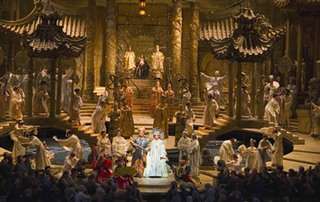|
Back
Viva Zeffirelli! New York
Metropolitan Opera
10/28/2009 - & October 31, November 3, 7 (1pm), 10, 14, 18, 21, 2009 (1pm), January 4*, 7, 9, 13, 16, 20, 23 (1pm), 28, 2010
Giacomo Puccini: Turandot
Maria Guleghina (Turandot), Maija Kovalevska (Liù), Salvatore Licitra (Calàf), Hao Jiang Tian (Timur), Bernard Fitch (Emperor Altoum), Joshua Hopkins (Ping), Tony Stevenson (Pang), Eduardo Valdes (Pong), Patrick Carfizzi (Mandarin), Antonio Demarco (Executioner), Sasha Semin (Prince of Persia)
Metropolitan Opera Orchestra and Chorus, Andris Nelsons (conductor)
Franco Zeffirelli (production and set designer), Anna Anni and Dada Saligeri (costume designers), Gil Wechsler (lighting designer), Chiang Ching (choreographer)

This season has been a hard one for the aged director Franco Zeffirelli, now 86 and reeling from a recent scandal in which a soprano and her tenor husband quit a Rome Opera production Zeffirelli is leading because he allegedly told her she was too fat for her role. Less cattily, but perhaps inflicting greater hurt, the Met’s General Manager Peter Gelb has made good on his commitment to begin replacing Zeffirelli’s productions for the house – all lavishly staged standard repertoire crowd pleasers dating from the 1980s and 1990s – with newer approaches by more “innovative” directors. On opening night, Zeffirelli’s spectacularly detailed 1985 Tosca (the first production I ever attended at the Met) yielded to the much booed and already infamously dull new production by Luc Bondy. New Years’ Eve marked the disappearance of the Italian director’s less impressive Carmen of 1996, in favor of Richard Eyre’s new effort. Zeffirelli’s La Traviata, another Met classic, will see its final bows this spring, to be replaced next season with something new and different by Willy Decker. Fortunately, we still have Zeffirelli’s Turandot, which dates from 1987 and does not appear to be under any immediate threat.
Attending the second run of this 23-year old production’s revival this season, it was a pleasure to see it holding up so well. The mammoth crowd of choristers and supernumeraries has not lost its capacity to impress the audience with the immenseness of medieval Beijing. The second act transition to the enormous set of the Imperial Palace sent my guest for the evening, who had never heard Turandot before, into a gasp of smiling awe. The colorful silks of the costumes radiated the same brightness they always have. Visually, at least, it was the lofty definition of grand opera.
The vocal effort brought the production more down to earth. I waited for the Met’s second cast Turandot this season because I wanted to hear the opera with Salvatore Licitra in the role of Calàf. A noted tenor once touted as the “new Pavarotti” (Licitra received highly favorable notices when he replaced the late superstar after Pavarotti cancelled what were meant to be his last Met performances in 2002), his recent record has been strong if not stunning. Two seasons ago he was a fine Riccardo in Un Ballo in Maschera, and he was well received in last season’s visually bleak new production of Il Trovatore. Last night Licitra hardly held to the standard. His fine Italianate legato buzzed through the first two acts, but his voice lacked dramatic impact and, to audible audience disappointment, he faltered on the embellished high note in the final “Vincerò” in the famous third act aria “Nessun dorma.”
Maria Guleghina has steadily improved over the years since I heard her unfortunate first Turandots at the Mariinsky Theater in St. Petersburg. I no longer dread hearing her sing “In questa reggia,” but she has not disciplined the shrill top notes that plague her upper register in too many roles. Nor have her dramatic abilities improved much. In the riddle scene and the subsequent temper tantrum Turandot throws when she realizes that Calàf has won the challenge and that she will have to marry him, Guleghina more closely resembled an outraged new Russian woman who has been cut in line for shoes than a regal ice princess consigned to the humanizing tedium of marriage. I had higher hopes after hearing the soprano’s stunning Adriana Lecouvreur at the Met last season. The two leads seemed to improve by the final scene, but the damage had already been done, and the realization that the rather grandiloquent ending is really Franco Alfano’s work (Puccini died before finishing the opera’s score) detracted from the moment.
Maija Kovalevska’s Liù was marred by a metallic quality that failed to convey the character’s sacrificial sweetness, even on the delicately ornamented the word “sorriso,” uttered when Liù explains that she, a slave, has helped Calàf’s blinded and exiled father because in happier days the young prince once smiled at her. Hao Jiang Tian’s sturdy bass still delivered what has become the house’s stock Timur. Joshua Hopkins, Tony Stevenson, and Eduardo Valdes were entertainingly well coordinated as the courtiers Ping, Pang, and Pong. Bernard Fitch underwhelmed as the Emperor. The Latvian conductor Andris Nelsons shows much promise and will make his debut at the Bayreuth Festival this summer. He led the Met Orchestra with fine musicianship. One wishes he could have done more with the singers.
Paul du Quenoy
|